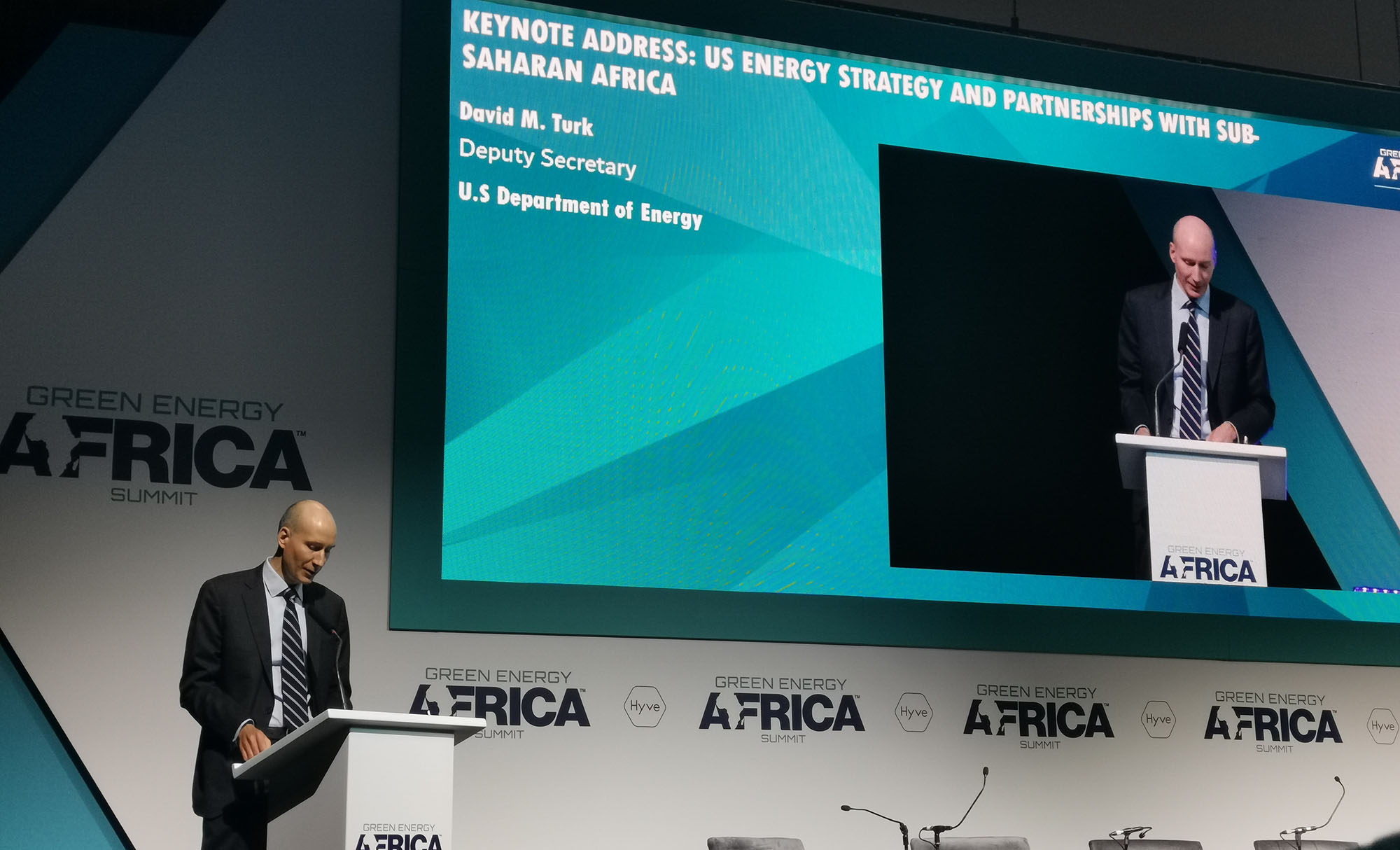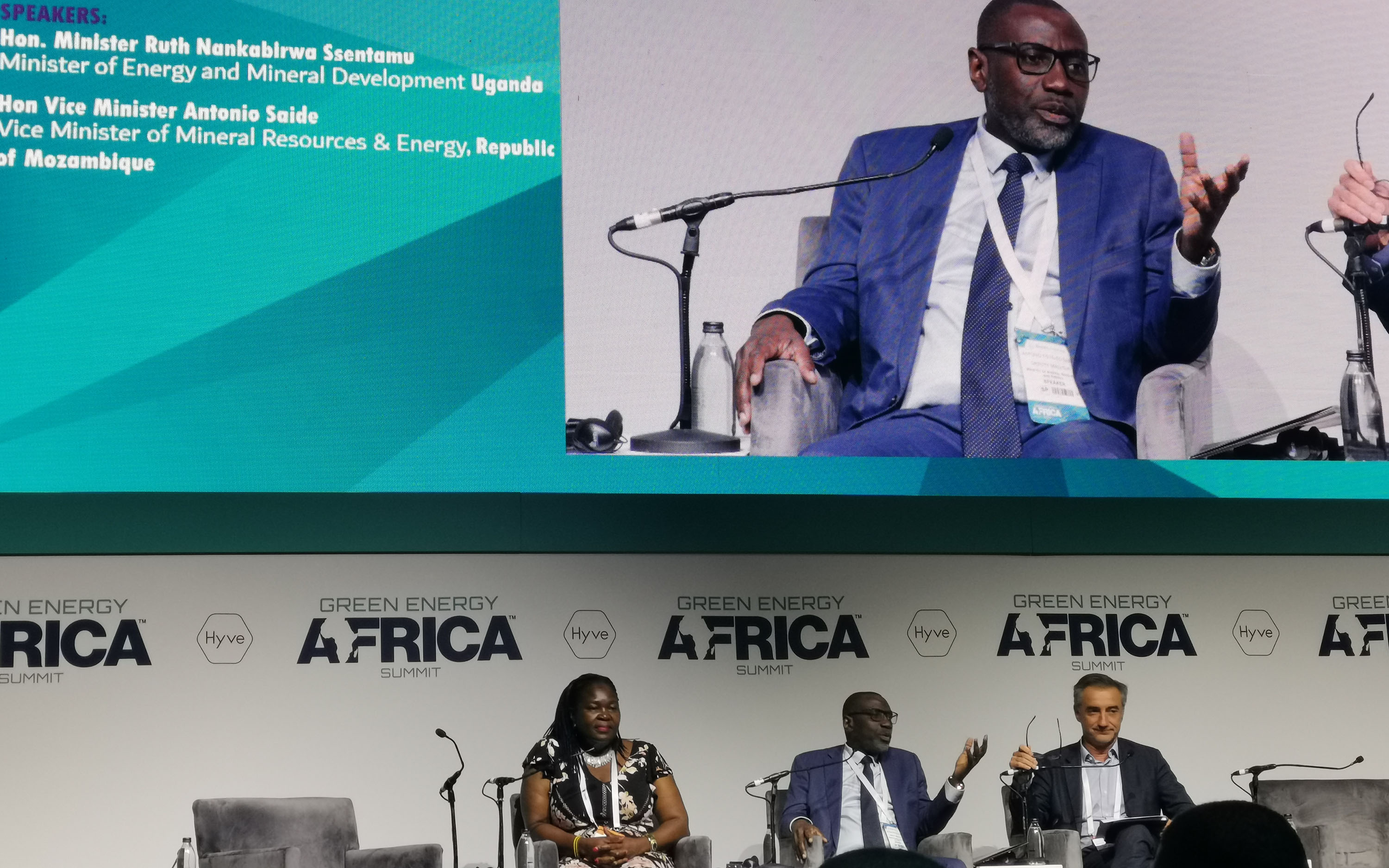“Sovereign countries must be treated as sovereign countries … the West has a lot to answer to Africa. We’ve tried so much to keep Africa green, we’ve tried so much, we need support towards the programme we have; without that support, we will keep grappling with this problem.”
So said Uganda’s Minister of Energy and Mineral Development, Ruth Nankabirwa Ssentamu, on Wednesday at the Africa Oil Week and Green Energy Africa Summit in a ministerial panel on nationally determined contributions (NDCs).
According to the United Nations (UN): “NDCs are where countries set targets for mitigating the greenhouse gas emissions that cause climate change and for adapting to climate impacts. Simply put, an NDC, or Nationally Determined Contribution, is a climate action plan to cut emissions and adapt to climate impacts.”
Malawi’s minister of energy, Ibrahim Matola, also shared his thoughts on Wednesday.
“Africa should be taken as a partner in developing the world but if the world wants to go fast in order to meet the target of transition, leaving Africa behind, the sustainable goals for energy for all will not be achieved when others are behind.
“We need to move together … let’s move without leaving anyone behind,” he said passionately.
“We have been talking about transition, but a hungry man knows no law.”
Nankabirwa Ssentamu’s sentiments were largely echoed by Mozambique’s vice-minister of mineral resources and energy, Antonio Saide.
“The point is … is it Africa emitting greenhouse gases?” he asked rhetorically.
In seeming reference to Africa’s relatively small contribution to global greenhouse gas emissions and use of renewable resources, Saide said: “What we have been doing, because we are committed to all the challenges that the world is facing, under our investment plans … are green actions … we are almost green countries.”
He continued, however: “Since we have been blessed [with] a very wonderful spectrum of energy resources … since we’ve realised that environmental problems have no boundary means that other counties are polluting but we are suffering from that, so we have to have a contribution to solve that problem. We are developing natural gas that will benefit the region as well as the world.
“All these actions we are taking will touch the world … in Mozambique, we can play a strong role in the energy transition. [The] action plan is clear … [there is a] clear target to be achieved. We are in a position of delivering solutions but alone we can’t. We need global input to reach global targets.”
Mozambique’s neighbour to the south, South Africa, is one of the most carbon-intensive economies on the planet and the most dependent on coal for power generation out of all the G20 group of countries. The International Energy Agency (IEA) has previously noted that the power sector’s transformation is “critical to clean energy transitions”, as the sector accounts for more than 40% of CO2 emissions from fuel combustion globally.
Rapidly reducing greenhouse gas emissions is imperative in order to limit the rise of the global average temperature increase to below the thresholds of 1.5°C and 2°C that define “dangerous climate change”.
Eskom’s reliance on coal
In South Africa, Eskom and its heavy use of and reliance on aged, unreliable coal infrastructure present the low-hanging fruit in the country’s mitigation efforts.
The new Eskom board chairperson, Mpho Makwana, said on the sidelines of the summit that “engaging at these events helps us find a common understanding of how to balance the notion of just access with the idea of a just transition. That’s the biggest challenge our continent faces.
“It’s important to understand that we only have one planet that is inhabitable for human beings. We are duty-bound to figure out how to change our actions to ensure it continues to be habitable for generations to come. We equally face the challenge that most members of society live in poverty. What is the point of talking about a future green planet where most people will still be poor?
“Just transition mechanisms must be balanced with the idea of ‘just access’. We need to figure out how to take everybody along so that the poorest of the poor feel like they are a part of this green future in a meaningful way — in terms of jobs, and access to economic opportunities.”
Asked about an ideal energy mix, cognisant of cost, environmental and developmental imperatives, Makwana said: “Firstly, there’s a government programme and policy that Eskom has to implement. But as we implement that policy, we need to be practical in our pursuit of a healthy energy mix … no single source of energy can give you absolute sustainability.
“Germany attempted to move to full wind power, and also learned some painful lessons. The difference between South Africa and Germany is that Germany’s neighbours have enough capacity to support their energy needs, and an integrated grid. South Africa is the only major producer in our region, and we do not have that luxury. We need to be responsible and careful in managing any transition to ensure that it’s sustainable.”
The chairperson continued: “Secondly, we need to remember the importance of ‘coal-based towns’ and the economic value chains that they support… the town of Ogies in Mpumalanga, if we were to — overnight — remove that town’s role as a coal town, what would the people of that town be expected to do? This applies to 10 similar towns in the region that currently are central to the provision of electricity in South Africa.”
 US Deputy Energy Secretary David M Turk speaking at the Africa Oil Week and Green Energy Africa Summit. (Photo: Ethan van Diemen)
US Deputy Energy Secretary David M Turk speaking at the Africa Oil Week and Green Energy Africa Summit. (Photo: Ethan van Diemen)
Visit Daily Maverick's home page for more news, analysis and investigations
Mantashe shares his thoughts
On Tuesday, Gwede Mantashe, the minister of mineral resources and energy, shared his thoughts about ideal outcomes for South Africa at Cop27 and the prospects for a just transition.
Asked what would be a good result from Cop27 for Africa and South Africa, Mantashe said: “Africa cannot be dictated to. There is a concept called ‘encirclement’; when you are encircled as a smaller economy you have no space to think, you are a conduit of the ideas of developed countries … and I think that is bad for Africa.
“Africa was colonised by other countries … our solutions must be homegrown. Africa must think of responding to challenges of the day … but when developed countries come to us and say that $8.5-billion is contingent on the accelerated decommissioning of coal, that is not in our interest. Developed countries must have a discussion with us about what they can contribute.”
Our Burning Planet previously reported that the European Union (EU), Germany, France, the UK and the US partnered to support South Africa’s climate action goals by helping to finance the move away from its heavy reliance on coal to cleaner and renewable energy sources.
The countries announced their partnership with South Africa at the Cop26 climate negotiations in Glasgow, Scotland, and pledged $8.5-billion over the next three to five years in the form of grants, concessional loans and investment and risk-sharing instruments, including mobilising private sector funding.
Mantashe continued: “COP27 is a global forum that discusses climate change. The best result for us is the realisation that Africa is unique, and Africa has its own unique challenges and whatever comes out of COP27 must respond to those challenges.
“We are not going to get solutions from the EU, whether it is a green economy or blue economy or black economy. Everything you use is either planted or mined, therefore a developed economy must invest in Africa. We must not ringfence investment in fossil fuels.”
Renewable energy generation
Asked whether energy access, energy poverty, Africa’s resource endowment and its relatively small contribution were a reasonable justification to develop the continent’s fossil fuel infrastructure, Tracey Davies, executive director of Just Share said: “There is a plethora of expert reports that confirm that rapid and extensive scaling-up of renewable energy generation is the most cost-optimal energy pathway for the continent and presents significant economic benefits and opportunities.
“Coal, oil, and gas are a poor solution for energy access: of the 800 million people worldwide who lack electricity, 85% live in rural areas where distributed renewable energy can provide electrification much more quickly and much more cheaply than fossil fuels.”
In particular reference to the $8.5-billion offer to accelerate the decommissioning of coal infrastructure in South Africa, Mantashe on Tuesday said: “There is an offer on the table, we must use it. We must direct it to a project decided by us, in an approach decided by us.”
In tune with a number of other speakers on Wednesday, the US deputy secretary of energy, David Turk, in a keynote address on US energy strategy and partnerships with sub-Saharan Africa, identified energy access as the most important key requirement of any country’s energy system.
“I really deliberately start with this, the access; it all starts with access. If you’re a country without access to energy, if your people don’t have access to electricity, nothing else matters from the energy side of the equation.”
He said that the biggest emitters should “get their act together”.
“I think it’s incumbent upon every country, especially those who are the biggest emitters to get their act together; that should be a requirement, that should be something that we demand of each other in the international context.”
Turk added: “In the African context, one statistic that I think shows the unfairness of the situation is [that] Africa right now is about 20% of the world’s population. In terms of global emissions, it’s 3%. So, it’s 20% of the world’s population, and only 3% of the global emissions … so that shows you who needs to get their act together.” DM/OBP




 US Deputy Energy Secretary, David M. Turk speaking at the Africa Oil Week and Green Energy Africa Summit. (Photo: Ethan van Diemen)
US Deputy Energy Secretary, David M. Turk speaking at the Africa Oil Week and Green Energy Africa Summit. (Photo: Ethan van Diemen)
